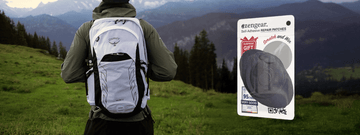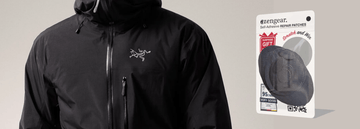Tips to Have a Better Night’s Sleep in the Outdoors: Silicone Earplugs and Natural Sleep Aids
by Emily Jannet on Jun 19, 2023
Sleeping in the great outdoors can be a rejuvenating and peaceful experience, allowing you to connect with nature and escape the hustle and bustle of everyday life. However, the unfamiliar surroundings and noises can make it challenging to get a good night's sleep. In this article, we will explore some helpful tips and techniques to ensure a restful night's sleep while camping or spending time outdoors. We will discuss the benefits of silicone earplugs and natural sleep aids, along with other strategies to create a comfortable sleeping environment.
Importance of Sleep
Sleep plays a vital role in maintaining overall health and well-being. It is during sleep that our bodies repair and regenerate, allowing us to wake up refreshed and ready for the day ahead. Quality sleep is especially crucial when spending time outdoors, as it helps us recharge and make the most of our outdoor activities.
Challenges of Sleeping Outdoors
Sleeping in the outdoors presents unique challenges compared to sleeping in the comfort of our homes. The unfamiliar environment, noises from wildlife, and temperature fluctuations can disrupt our sleep patterns. Additionally, the lack of proper bedding and sleeping arrangements can lead to discomfort and restless nights.
Preparation for a Good Night's Sleep
To ensure a better night's sleep outdoors, it's essential to prepare adequately. Here are some key steps to follow:
Choosing the Right Camping Gear
Investing in high-quality camping gear can make a significant difference in your sleeping experience. Opt for a comfortable and supportive sleeping pad or mattress to provide cushioning and insulation from the ground. A well-insulated sleeping bag suitable for the weather conditions will keep you warm and cozy throughout the night.
Setting Up a Comfortable Sleeping Area
When setting up your sleeping area, choose a flat and level spot away from any potential hazards. Clear the area of rocks, sticks, and other uncomfortable debris. Use a tent or a hammock with a bug net to protect yourself from insects and other critters.
Creating a Relaxing Environment
Establishing a calming and relaxing environment can greatly enhance your sleep quality. Use dim lighting or a headlamp instead of bright overhead lights. Consider bringing along some comforting items from home, such as a favorite pillow or a soft blanket. Play soothing nature sounds or calming music to create a tranquil ambiance.
Silicone Earplugs for Noise Reduction
One of the most common challenges of sleeping outdoors is the presence of loud and unfamiliar noises. Silicone earplugs can be a game-changer in minimizing disruptive sounds and promoting better sleep.
Benefits of Silicone Earplugs
Silicone earplugs are an excellent choice for noise reduction due to their soft and malleable nature. They create a seal in the ear canal, blocking out unwanted noise and allowing you to sleep in peace. Silicone earplugs are also reusable, making them a cost-effective and environmentally friendly option.
How to Properly Use Silicone Earplugs
To use silicone earplugs effectively, follow these steps:
- Clean your hands thoroughly before handling the earplugs.
- Gently roll the earplug between your fingers to compress it.
- Reach over your head with one hand and pull your ear up and back.
- Insert the compressed earplug into the ear canal.
- Hold the earplug in place for a few seconds until it expands and creates a snug fit.
- Repeat the process with the other ear.
Tips for Choosing the Right Silicone Earplugs
When selecting silicone earplugs, consider the following factors:
- Look for earplugs specifically designed for sleeping or noise reduction.
- Choose earplugs with a high noise reduction rating (NRR) for maximum effectiveness.
- Opt for hypoallergenic earplugs if you have sensitive skin or allergies.
- Ensure the earplugs fit comfortably in your ears without causing any discomfort or pain.
Natural Sleep Aids for Restful Sleep
In addition to silicone earplugs, certain natural sleep aids can promote a more restful and uninterrupted sleep experience in the outdoors. Here are some popular options:
Chamomile Tea
Chamomile tea is known for its calming properties and can help relax the mind and body before bedtime. Brew a cup of chamomile tea and enjoy it about an hour before you plan to sleep. Its soothing effects can aid in falling asleep faster and experiencing a deeper sleep.
Lavender Essential Oil
Lavender essential oil has long been used for its relaxing and sleep-inducing properties. Add a few drops of lavender essential oil to a diffuser or sprinkle a small amount on your pillow before sleep. The gentle aroma will create a serene atmosphere and promote a sense of calmness.
Magnesium Supplements
Magnesium is a mineral that plays a crucial role in promoting quality sleep. Taking magnesium supplements before bed can help relax muscles, calm the nervous system, and improve sleep quality. Consult with a healthcare professional to determine the appropriate dosage for your needs.
White Noise Machines
White noise machines produce a consistent and soothing sound that masks other noises and distractions. They create a background noise that can help drown out any disturbances and promote better sleep. Compact and portable white noise machines are available, making them suitable for outdoor use.
Establishing a Bedtime Routine
Establishing a bedtime routine is essential for signaling your body that it's time to wind down and prepare for sleep. Consider the following practices:
Consistent Sleep Schedule
Try to maintain a consistent sleep schedule even when outdoors. Going to bed and waking up at the same time each day helps regulate your body's internal clock and promotes better sleep quality.
Wind-Down Rituals
Engage in relaxing activities before bed to prepare your mind and body for sleep. This can include gentle stretching, reading a book, practicing meditation or deep breathing exercises, or journaling your thoughts. Avoid engaging in stimulating activities or using electronic devices with bright screens, as these can interfere with sleep.
Maintaining Comfort and Safety
Apart from utilizing sleep aids and earplugs, it's crucial to prioritize comfort and safety when sleeping outdoors. Consider the following:
Appropriate Clothing and Bedding
Dress in layers to adapt to changing temperatures during the night. Use moisture-wicking and breathable fabrics to stay comfortable. Ensure your bedding, such as sleeping bags and blankets, is suitable for the weather conditions and provides adequate insulation.
Protecting Yourself from Insects
Insect bites and buzzing mosquitoes can disrupt your sleep. Use insect repellents, wear long sleeves and pants, and consider using mosquito nets or screens to create a barrier between you and the insects.
Ensuring Safety in the Outdoors
Before settling down for the night, ensure your camping area is safe and secure. Be aware of any potential hazards like uneven terrain, falling branches, or proximity to water bodies. Follow proper camping protocols and guidelines to ensure your safety throughout the night.
Bottom Line
Having a better night's sleep in the outdoors is achievable with the right strategies and tools. By incorporating silicone earplugs, natural sleep aids, and implementing a bedtime routine, you can enhance your sleep quality and fully enjoy your outdoor adventures. Remember to prioritize comfort, safety, and relaxation to make the most of your time under the stars.




